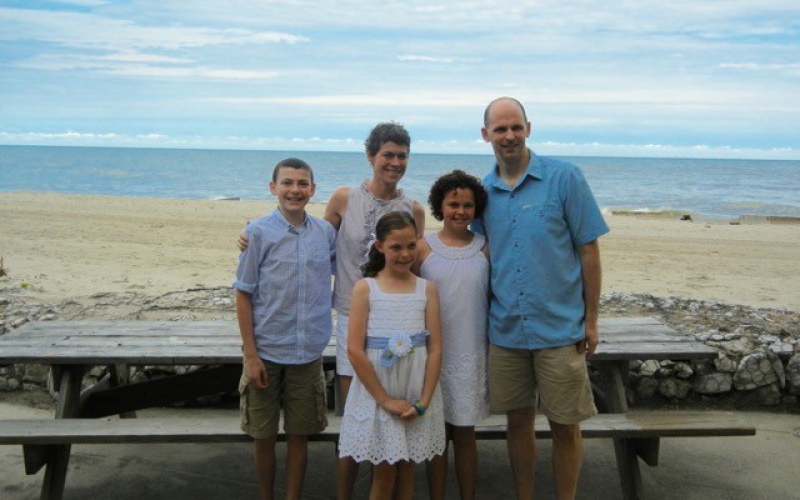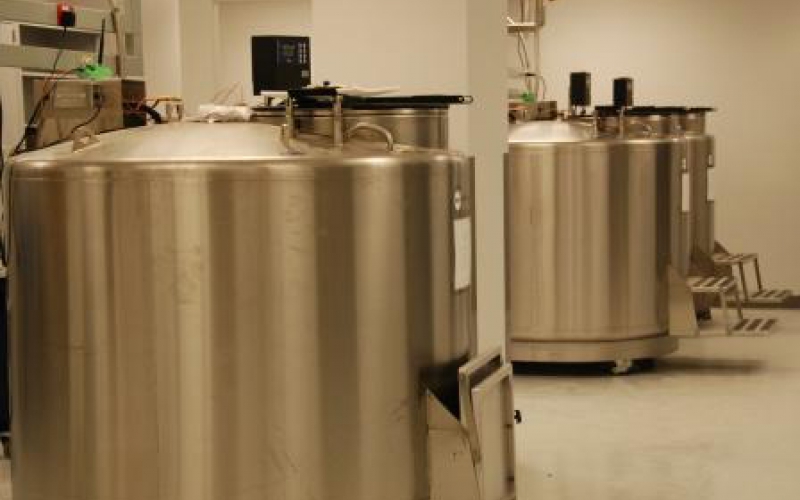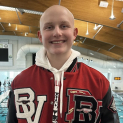Down in Lubbock, Texas, researcher Dr. Patrick Reynolds is working to grow cancer cell lines in order to eventually cure childhood cancer. Funded in part by Alex’s Lemonade Stand Foundation, Dr. Reynolds leads the Childhood Cancer Cell Repository, a bank of about 450 cancer cell lines and 75 genomic models. As researchers focus on targeted therapies for children, cell lines and genomic models offer invaluable clues. To date, Dr. Reynolds’ banked cell lines and models have been distributed to 350 oncology investigators across the United States and in 21 countries for use in childhood cancer studies. Many of the cells have been donated by families after their child has died—making every cell a precious, everlasting gift with a story. Here is the story of Fly623 and Alex Podeszwa, a young man whose fight continues beyond his own life.
by Adam Paris
Alex Podeszwa’s fight with cancer started with a sudden and severe pain while he was walking home from the park in 2005. That weekend, his mother Ann asked his father, Dave, a pediatric orthopedic surgeon, to secure Alex an appointment the following Monday.
By the time Alex’s scans concluded that Monday evening, Ann received a call from Dave asking her to come to the hospital immediately.
The scans showed Alex had neuroblastoma. The family braced for the worst when they discovered the extent of the disease.
“We had one doctor tell us that it might not be worth treating because it was in his leg and he had some spots in his lungs and it was on his skull,” said Ann. “The primary tumor was on the adrenal gland. It was everywhere.”
Despite what this doctor said, Alex’s parents decided to fight this disease with all they had. They wasted no time planning Alex’s treatment, starting chemotherapy at Cook’s Children Hospital in Fort Worth, TX. Unfortunately, Alex wasn’t improving from the initial chemo, prompting a search for new options.
A solution emerged from the state where Alex’s father grew up, a Metaiodobenzylguanidine (MIBG) study at the University of Michigan. A novel treatment at the time, MIBG is now known for its effectiveness against neuroblastoma. Alex and Ann relocated from Texas to live with Dave’s family in Detroit and enrolled in the trial. For the family, it felt like a launching pad.
“That MIBG treatment made a huge difference on the progression of his disease,” said Ann. “It put us back in a position to have a fighting chance.”
It slowed the growth of Alex’s cancer, but couldn’t completely eliminate it. Alex continued to survive, but his parents knew it was a temporary solution. Their search for new trials continued. In 2014, they discovered Dr. Yael Mossé’s anaplastic lymphoma kinase (ALK) inhibitor trial at Children’s Hospital of Philadelphia (CHOP). The inhibitor works by disrupting the ALK gene, a cancer-causing gene abnormally turned on in kids with some types of cancer. The goal is that the disruption helps prevent cancer formation.
“We enrolled Alex in a trial for the very first ALK inhibitor that we developed for children with neuroblastoma and this gene abnormality,” said Dr. Mossé. “Alex did very well for some time, but then what happened is what sometimes inevitably happens, the tumor developed resistance to the drug.”
Once more, Alex’s tumor stymied a researcher’s experiment. Resistance was becoming an increasingly apt word for Alex, both for his resilient attitude and his tumor’s stubborn penchant for sticking around.
Beyond his own life
In September 2014, at the age of 14, Alex passed away. However, his family found a way to continue his commitment to fighting cancer by donating his cancerous cells to Dr. Patrick Reynolds’ lab, the Childhood Cancer Repository. Funded in part by ALSF, the repository aims to solve a prominent issue for childhood cancer researchers: the sub-optimal models they receive to test new treatments. Dr. Reynolds developed patient-derived xenografts (PDX), which involve organically growing donor tumors within mice rather than growing tumor cells in a piece of lab equipment. Alex’s relapsed neuroblastoma cells are a rarity in the childhood cancer world and Dr. Reynolds could use Alex’s tumor to create multiple cell lines for researchers.
When the Podeszwa family learned that Alex’s cells could potentially help another child survive this disease, their decision was an easy one.
“We basically told the doctors that they needed to reach out and figure out how we can capture as many of Alex’s cells as possible,” said Ann.
Following a successful withdrawal and transfer of the tumor to Dr. Reynolds, waiting was all the Podeszwa family could do.
After months of no growth, Dr. Mossé offered to try cultivating the cells at her lab at Children’s Hospital of Philadelphia (CHOP). Finally, after over a year, Alex’s cells grew. Eventually, the tumor sample was large enough for Dr. Mossé to slice into smaller pieces and grow each one individually. Now Alex’s prosperous cell line (nicknamed Fly623 after his love of flight and his birthdate) remains the only ALK-resistant neuroblastoma cell line available. It has presented plenty of hurdles to Dr. Mossé’s lab when testing novel treatments, but they know any breakthroughs will be a significant step forward.
Today, Alex’s gift has been used by researchers across the country to test drugs that might be the cure for certain types of neuroblastoma. ALSF continues to fund Dr. Reynolds in his quest to create more viable childhood cancer models and to give researchers more tools as they work towards cures. In addition to funding Dr. Reynolds’ cell line repository, ALSF has supported several of Dr. Mosse’s projects that utilize Alex’s cells, including a clinical trial for children with relapsed neuroblastoma.
Alex’s parents both remain involved with ALSF through fundraising efforts. Both Ann and her brother have run marathons for Team Lemon, ALSF’s charity racing team. They believe the Foundation provides the best opportunity for breakthroughs in all childhood cancers.
“We need to create an environment where investigators can be incentivized to fight against pediatric cancer and you don’t necessarily do that as effectively if you focus all your funding on one cancer,” said Ann. “That’s why I really like what ALSF does.”
More than anything though, they hope Alex’s legacy could mean a cure for another child someday.
“We are beyond grateful for everything that Alex’s Lemonade Stand Foundation does,” said Ann. “Because we know even if our kid couldn’t make it, someone else’s could.”
Since 2005, ALSF has funded nearly 1,000 research grants at 135 institutions across the U.S. and Canada. Learn more about the ALSF childhood cancer grants program and Dr. Reynolds here.




